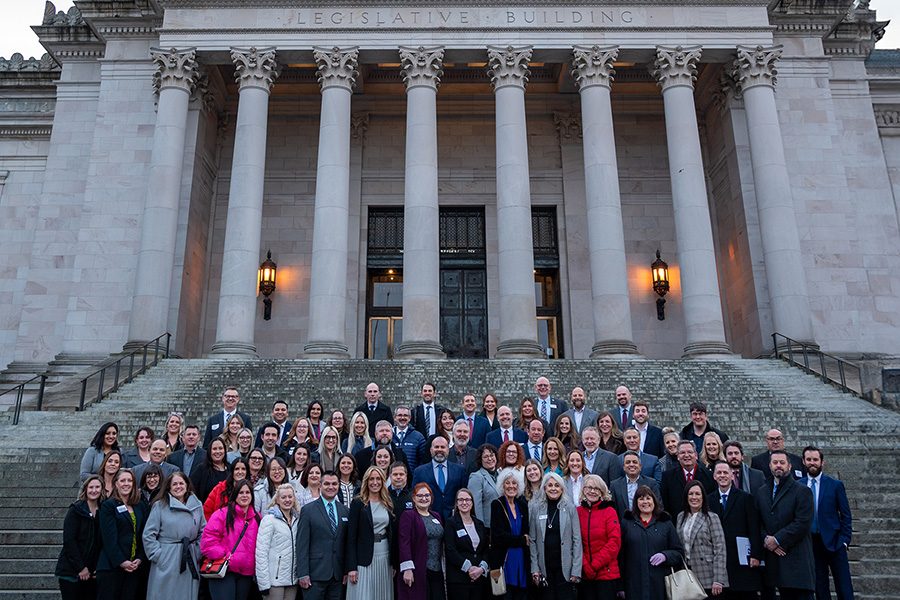
Dozens of Tri-City leaders recently visited Olympia to connect with lawmakers and promote priorities for the Tri-City area.
Courtesy Sean O’BrienWhat bills sponsored by Tri-City lawmakers are still alive?
Tri-City lawmakers have seen some of the bills they are sponsoring or co-sponsoring – concerning housing, career and higher education and even littering – survive the first cutoffs for consideration during the 2025 legislative session.
But some of the legislation they introduced, including a bill from state Sen. Matt Boehnke that would have removed the governor from energy facility siting decisions, have not advanced.
Here are some of the notable successes of the session so far involving Tri-City lawmakers, as of March 6. Bills must be passed by their chamber of origin by March 12 to remain under consideration.
Housing
HB 1022: State Rep. April Connors’ Homes For Heroes program has received bipartisan support. It would require the state Department of Commerce to create a pilot program that would provide down payment and closing cost assistance to qualified individuals working in law enforcement, emergency services, health care and child care. Approved by the House, moving to the Senate for consideration.
HB 1096: This bill, which includes Connors among its sponsors, would ease barriers to lot splitting as part of an effort to increase housing. Approved by the House, moving to the Senate for consideration.
Education
SB 5542: This bill from Boehnke would expand tuition waivers for high school completers at community/tech colleges by removing the requirement that students be 19 years of age or older to qualify. Approved by the Senate, moving to the House for consideration.
SB 5543: Another bill from Boehnke that would make students who have received a high school equivalency certificate eligible to receive a College Bound Scholarship. Approved by the Senate, moving to the House for consideration.
HB 1722: Another career and technical education bill from Connors aims to lift barriers to minors training and working as emergency medical technicians and firefighters. Being scheduled for consideration on the House floor.
HB 1285: This bipartisan bill from state Rep. Skyler Rude and co-sponsored by Connors would make financial education a high school graduation requirement. Approved by the House, moving to Senate for consideration.
HB 1414: Connors’ bill would have the Office of the Superintendent for Public Instruction, along with the Department of Labor & Industries, find ways to remove barriers to students working in various career fields and with industry professionals. Approved by the House, moving to Senate for consideration.
Miscellaneous
SB 5014: This bill on election security from Boehnke would expand the secretary of state’s oversight of the equipment and platforms used in elections, require election officials to disclose security breaches and set cybersecurity requirements for county election offices. Approved by the Senate, currently being considered by House.
HB 1293: Several Mid-Columbia lawmakers are supporting this bill that would increase penalties for littering and direct the state Department of Ecology to develop recommendations to reduce litter. Approved by the House, moving to the Senate for consideration.
Among the bills that didn’t advance:
SB 5015: Boehnke filed his bill to remove the governor from future energy facility siting decisions in response to controversy around the location of the Horse Heaven Hills Energy Complex by Scout Energy in Benton County.
HB 1679: This bill from Barnard would have encouraged electric utilities in the state to invest in nuclear power to comply with the Clean Energy Transformation Act.
HB 1164: Connors and Barnard supported this bill that would have expanded urban growth boundaries for residential development.
HB 1057: A bill from state Rep. Stephanie Barnard that aimed to promote economic development by increasing state support and efforts to communities seeking federal grants.
The 105-day legislative session ends April 27.
